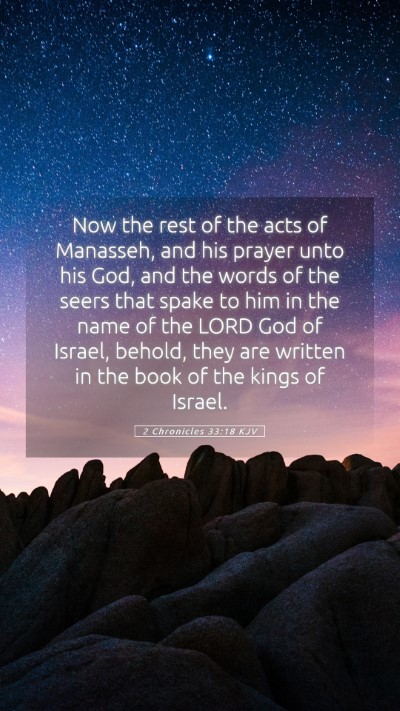Understanding 2 Chronicles 33:18
Bible Verse: 2 Chronicles 33:18 - "Now the rest of the acts of Manasseh, and his prayer unto his God, and the words of the seers that spake to him in the name of the Lord God of Israel, behold, they are written in the book of the kings of Israel."
Overview of the Verse
This verse serves as a closing remark regarding the reign of King Manasseh, one of the most notable rulers of Judah. It emphasizes the importance of Manasseh's later repentance and the divine guidance received through prophecy. The verse highlights Manasseh’s prayer and the enduring memory of his actions throughout his reign.
Bible Verse Meanings and Interpretations
Interpretations of this verse reveal several critical insights about God's mercy, the role of prayer, and the consequences of one's actions. Let's delve into the detailed explanations from various public domain commentaries:
Commentary Insights
-
Matthew Henry:
Henry emphasizes that despite the grievous sins committed by Manasseh, his sincere prayer for forgiveness showcases the depth of God's mercy. This highlights a central theme in Scripture: regardless of one's past transgressions, repentance can lead to restoration. The verse indicates that Manasseh's later acts and his genuine seeking of God were significant enough to warrant recording in the historical accounts.
-
Albert Barnes:
Barnes discusses how the mention of the 'words of the seers' indicates the prophetic voices that reached Manasseh during his reign. This suggests that God was actively reaching out to His people, warning and guiding them even when they strayed far from Him. The recording of Manasseh’s story serves as a powerful reminder of God’s redemptive power and the call to return to Him.
-
Adam Clarke:
Clarke notes that the text illustrates the traditional practice of documenting the reigns of kings for historical purposes. He points out that Manasseh’s prayer signifies a vital turning point in his life, where he acknowledges his sins and seeks divine intervention. The call to remember and record these acts suggests his legacy was not merely in his sins but also in his repentance.
Bible Verse Commentary and Analysis
In examining this verse, we can draw several applications and insights for today’s readers. It prompts us to consider the following:
- Repentance and Forgiveness: The narrative illustrates that no sin is beyond God's forgiveness, provided there is genuine repentance. This encourages believers to seek God earnestly, even after straying from His path.
- The Role of Prophecy: The mention of 'seers' demonstrates the importance of taking heed of prophetic messages in our lives today, emphasizing that God communicates with us through various means, especially His Word.
- Historical Context: Understanding the historical acts of Manasseh enables contemporary readers to appreciate the larger narrative of redemption woven throughout Scripture, reinforcing the need for guidance through Bible study resources and tools.
Applying the Verse to Daily Life
As we reflect on 2 Chronicles 33:18, we can consider:
- Daily Prayer: Like Manasseh, we should engage in sincere prayer for guidance, acknowledgment of our mistakes, and request for strength to walk in the light.
- Heeding Spiritual Counsel: Remain open to receiving counsel from spiritual leaders and Scripture, utilizing Bible study materials that direct us towards righteous living.
- Documenting Spiritual Growth: Keep a personal record of your spiritual journey and significant moments of repentance and growth, similar to how the kings' records serve as historical references.
Related Bible Cross References
- 2 Kings 21:1-18: A parallel account of Manasseh's reign and sins.
- 2 Chronicles 30:9: Encouragement to return to the Lord for healing and restoration.
- Psalm 51: David’s prayer of repentance, which resonates with the themes in Manasseh's story.
Conclusion
The exploration of 2 Chronicles 33:18 reveals profound insights into the nature of God’s mercy, the significance of prophetic voices, and the transformative power of sincere repentance. As we engage with this verse through Bible study insights, we unearth its relevance not only in the historical context but also for our current spiritual walk.


